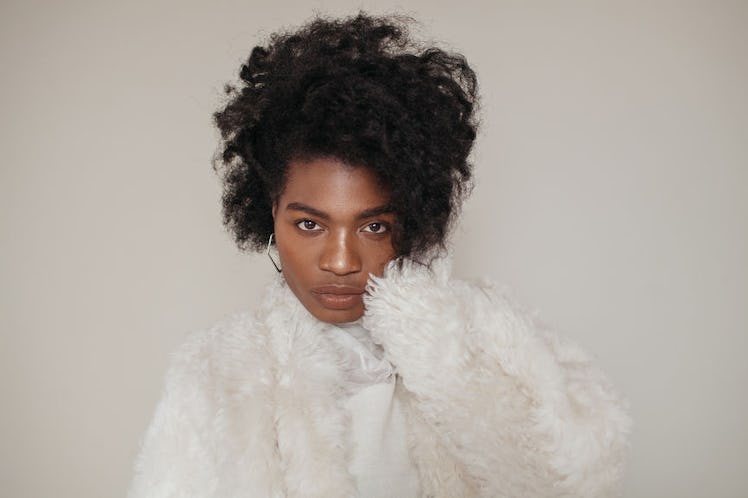
Science Says Eye Contact Isn't Nearly As Meaningful As You Think It Is & Here's Why
People make such a big deal about the importance of eye contact. Whether you're preparing to go on a date or impress someone at a job interview, I'm sure you've gotten some kind of advice about how "crucial" it is that you're looking people right in their peepers. But does eye contact really mean anything? Well, friends, there's some good news for the shy folks among us, for whom eye contact can often be a real challenge and discomfort. According to the results of a new study, eye contact really might not be as meaningful or impactful as it's cracked up to be.
The new study comes from Edith Cowan University (ECU) in Australia, where researchers used eye-tracking technology to show that you really don't actually need to look directly in the eyes of your audience or a person you're talking to in order to be perceived as making eye contact with them. In other words, looking at the top of someone's head, at their nose, or even their cheek, is just fine, and will apparently communicate the same sense of engagement and attention.
So here's how the study went down: According to a ScienceDaily press release, one of the researchers conversed with 46 young adult participants, while both individuals in the conversation wore eye-tracking glasses (sounds fancy, right?). For about half the conversations, the researcher intentionally made eye contact with the participants, and for the other half, the researcher looked instead around their mouth. Post-convo, the researchers asked the participants to rate their level of enjoyment of the conversation.
The results, which have been published in Perception, a journal that covers all aspects of perceptual sciences, showed that, for those who weren't on the receiving end of direct eye contact, they "perceived the same amount of eye contact and enjoyed the conversations just as much" as those who engaged in direct eye contact, per the study's press release. So yeah, you read that right: Not only did the mouth group enjoy the conversation just as much sans eye contact, they actually felt like they were making the same amount of eye contact as the other group, even though they technically weren't.
Lead study author Dr. Shane Rogers, of the ECU's School of Arts and Humanities, said in the press release,
Maintaining strong eye contact is widely accepted to be an important communication skill in western cultures.
People believe if you aren't willing to engage in soul-to-soul mutual eye contact then you are at best lacking in confidence, at worst, untrustworthy. However, the reverence devoted to eye contact is not supported by scientific evidence.
So, does this mean you can start looking at the floor while you talk to people without coming off as cold or impersonal? Not exactly, says counselor and relationship expert David Bennett (who was not involved in the ECU study). It just means that you can give yourself a lot more leeway when it comes to how physically present you are in a conversation. Like, you don't have to have your eyes locked on the other person's the entire time. I'd say that's reason enough for a sigh of relief, right?
"The study doesn't say eye contact isn’t important per se, it shows that you don’t have to make direct eye contact for someone to perceive you as looking them in the eye," Bennett explains in an email to Elite Daily. "This is pretty important because a lot of people get very nervous making direct eye contact and overthink the whole thing."
Bottom line: Simply looking at someone's face while you talk to them — whether you want to look near their cheek, their nose, their mouth, wherever — will likely be perceived as making eye contact. So give that a try the next time you're at a party and feeling a bit anxious about striking up a conversation with someone new. You might be surprised at how much less pressure you feel.